Villa di Maria + MMUN
What is MMUN?
You may have seen the acronym, MMUN, in our Facebook or Instagram feed, or generously contributed to an MMUN fundraiser (thank you!!) but perhaps you may have wondered, what exactly is MMUN and why is everyone so excited about it? Montessori Model United Nations, affectionately known as MMUN, is a special journey for our sixth-year students, which culminates in a five-day trip to New York City for an international conference. Similar to traditional Model UN programs, each student assumes the role of delegate for a chosen nation and proposes solutions to complex global issues from their nation’s point of view. But for our delegates, the program is so much more.[gallery columns="2" size="full" ids="9254,9238"]
Montessori Model United Nations, affectionately known as MMUN, is a special journey for our sixth-year students, which culminates in a five-day trip to New York City for an international conference. Similar to traditional Model UN programs, each student assumes the role of delegate for a chosen nation and proposes solutions to complex global issues from their nation’s point of view. But for our delegates, the program is so much more.[gallery columns="2" size="full" ids="9254,9238"]
Beginnings: Peace, Dignity, Equality, Health
We begin each fall as students learn about the role and mission of the United Nations: peace, dignity, and equality on a healthy planet. It’s no coincidence that the mission of the UN echoes the vision of Dr. Maria Montessori herself, a lifelong advocate for peace education and equality. In 1927, Dr. Montessori even addressed the League of Nations, the predecessor to the United Nations. She spoke about the important role of education in achieving and maintaining world peace, and her words are still vitally relevant today.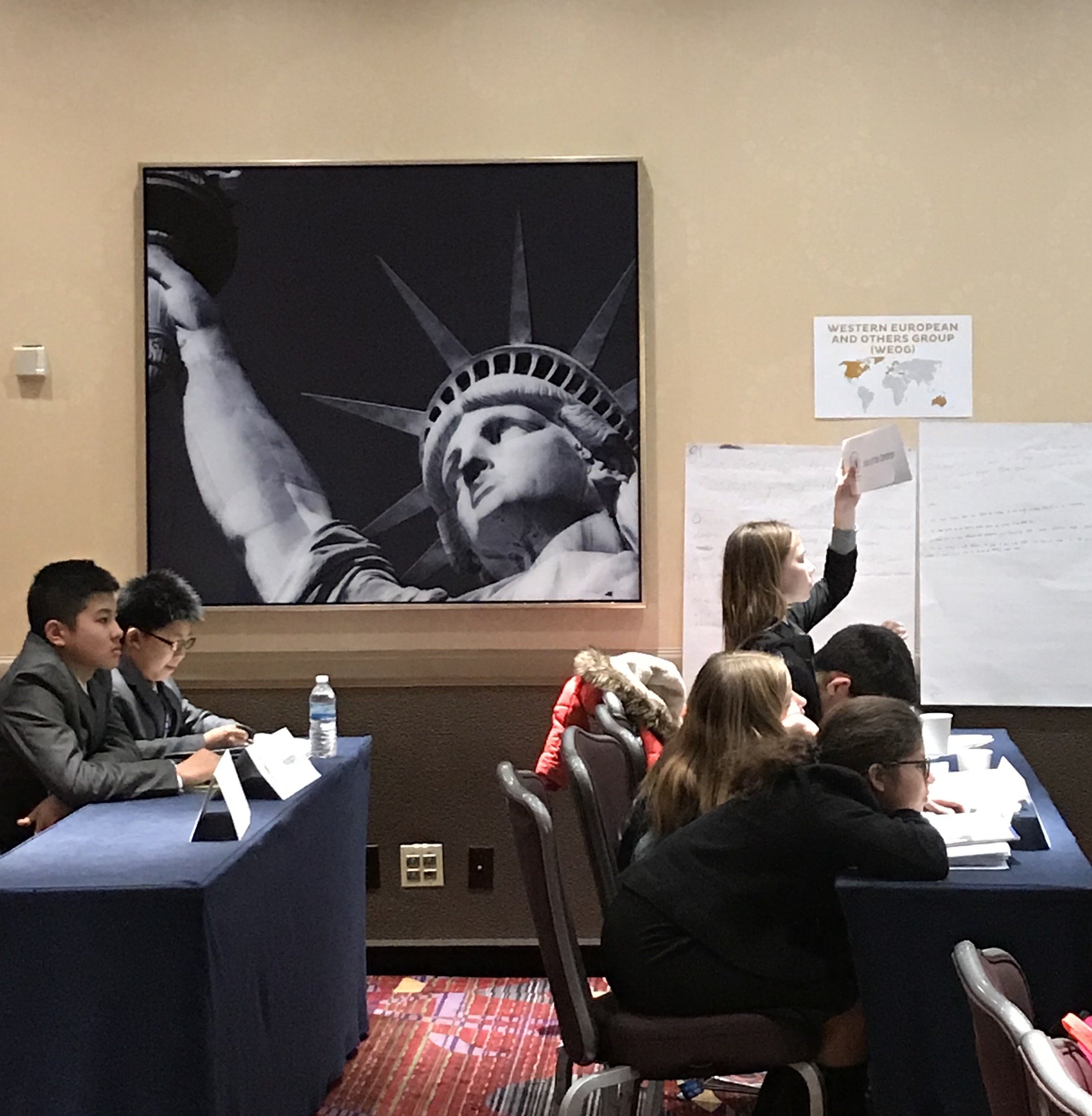
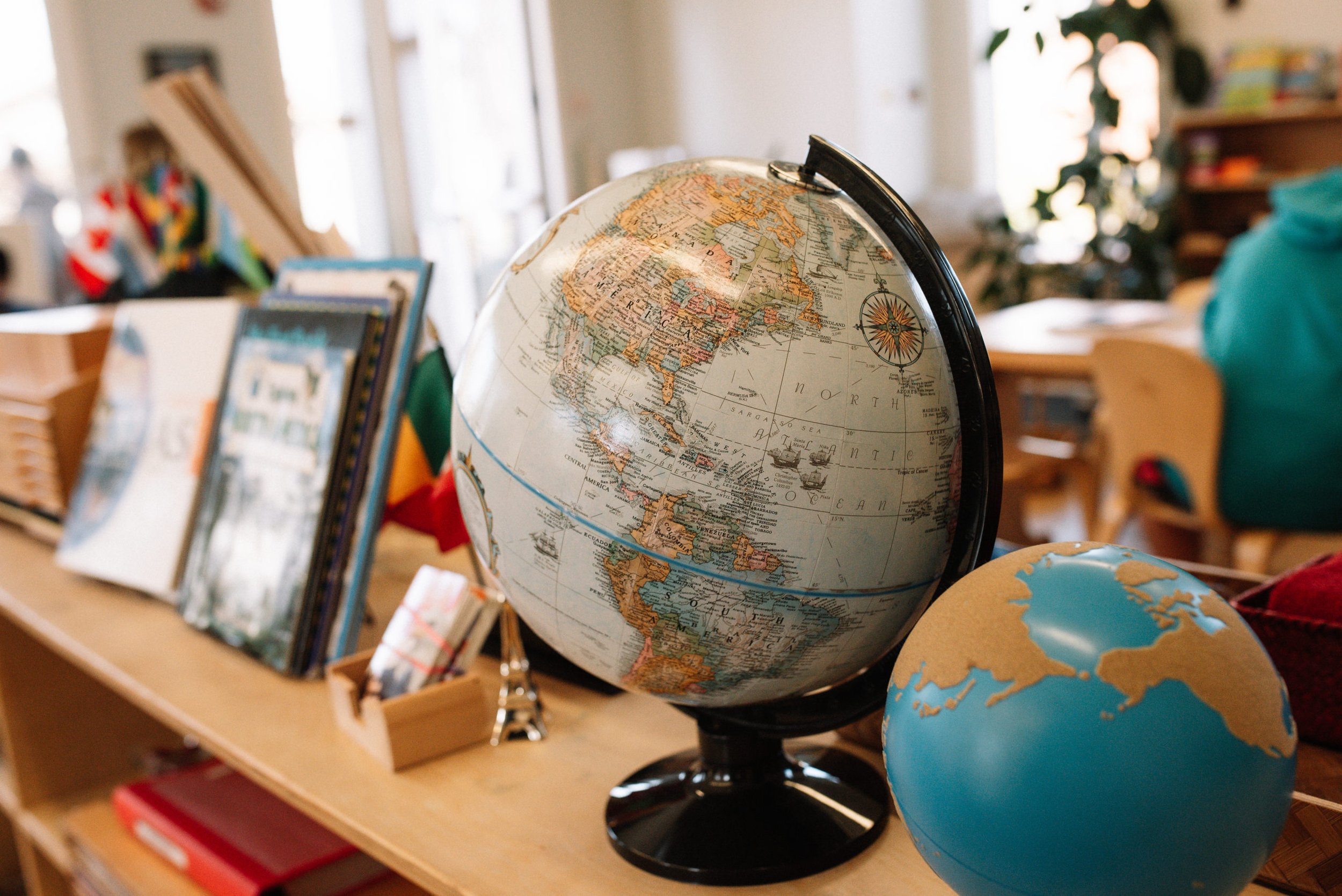
Research: Going Global
As our students take on the role of delegate, they must first get to know the nation they will represent. With partners, they research their nation’s history, culture, economy, and environmental issues and explore what daily life is like for citizens and how they meet their fundamental needs. Students are often surprised by the living conditions of people around the world. Things we often take for granted—clean drinking water, electricity, healthy food—may not be accessible for all citizens in their country. How can this be?? They wonder. Their awareness of inequality and injustice in the world grows, and delegates begin to imagine what their role might be in changing this.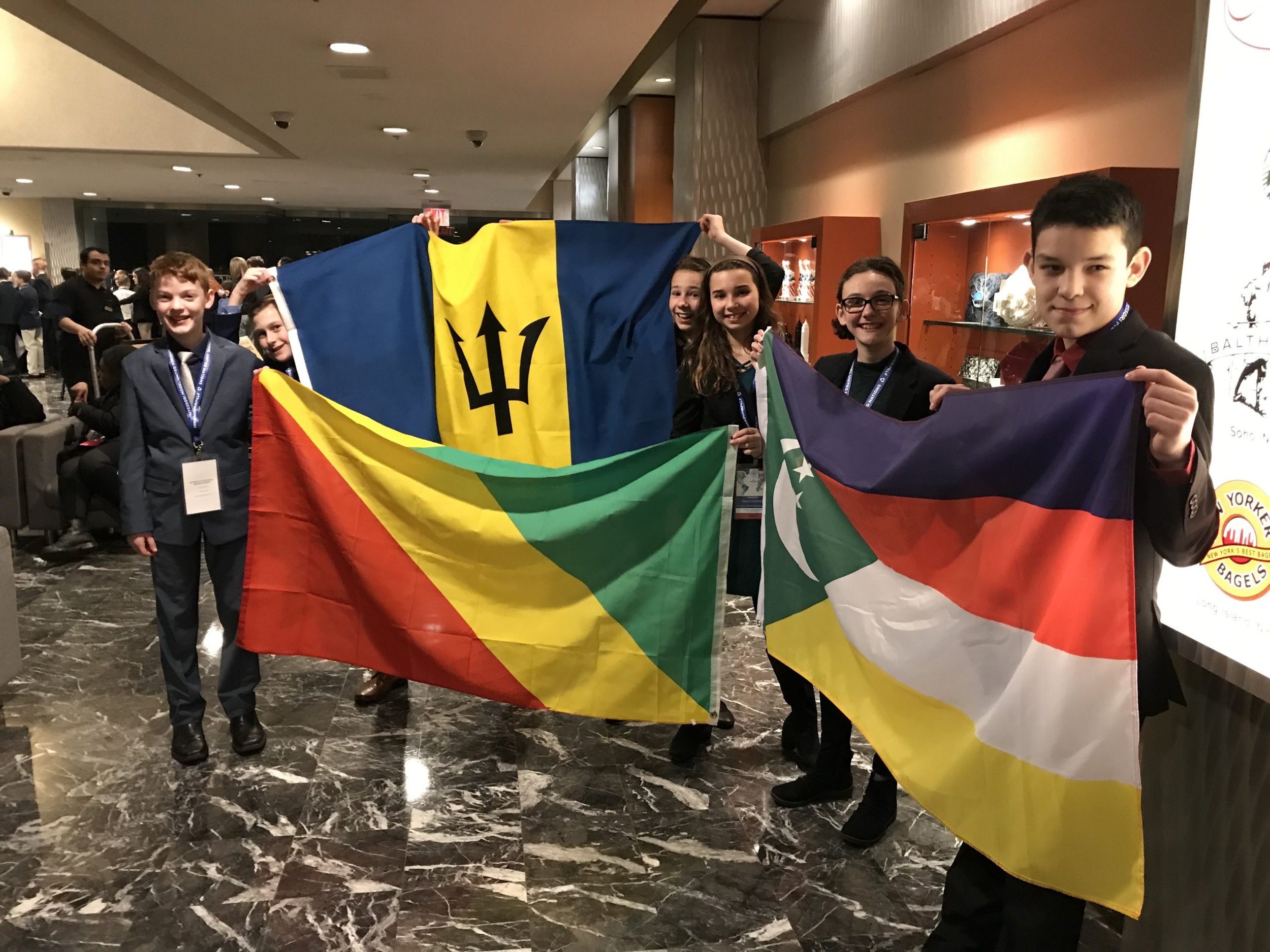 Delegates are assigned to UN Committees, which address complex issues like food security, fair trade, nuclear disarmament, xenophobia, poverty, and climate change. Their research now becomes focused on their particular topic. Students work to gain an understanding not only of the subject itself but also of their nations' approach to that subject. Our emerging adolescents must consider their own perspectives on these issues, and then do the challenging work to consider differing perspectives of others. During this process, the students' empathy for others and awareness of themselves as global citizens grow immensely.
Delegates are assigned to UN Committees, which address complex issues like food security, fair trade, nuclear disarmament, xenophobia, poverty, and climate change. Their research now becomes focused on their particular topic. Students work to gain an understanding not only of the subject itself but also of their nations' approach to that subject. Our emerging adolescents must consider their own perspectives on these issues, and then do the challenging work to consider differing perspectives of others. During this process, the students' empathy for others and awareness of themselves as global citizens grow immensely.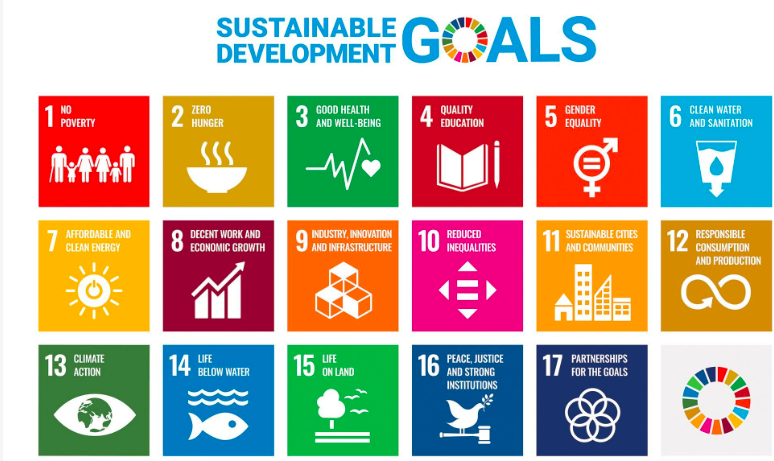 As does their research skillset: synthesizing information from multiple sources, evaluating websites for bias and authenticity, supporting claims with evidence, and always citing sources.
As does their research skillset: synthesizing information from multiple sources, evaluating websites for bias and authenticity, supporting claims with evidence, and always citing sources.
Position Paper: Perseverance and Achievement
Next, each student must organize their research into a formal paper, called the position paper. It summarizes the global issue and proposes evidence-based solutions that could be implemented locally and globally.The position paper is often the most challenging part of the MMUN program because it is the first time these students have synthesized such copious amounts of information into a cohesive paper. The process requires perseverance and dedication as students revise their papers to make their ideas more clear, more compelling. But when they finally submit their polished paper, their smiles beam with the satisfaction of achieving their goal. Many high-fives and victory laps around the Magic Circle ensue and we always celebrate with baked goods! 🥳
Speech: Community, Confidence, Celebration
Now the time comes for the delegates to share their views with the larger community. Students at VdM are no strangers to public speaking. From an early age in the Children's House they share ideas and perform in front of others; our Elementary students present reports and make special announcements regularly. Still, the idea of presenting one's speech to a roomful of strangers at a conference can be intimidating. To ease their apprehension, our delegates rehearse often with one another, offering feedback and support. And as a dress rehearsal, each delegate distills their position paper into a one-minute speech designed to inform an audience of their families and classroom peers about their issue and compel them to support the proposed solutions.
To ease their apprehension, our delegates rehearse often with one another, offering feedback and support. And as a dress rehearsal, each delegate distills their position paper into a one-minute speech designed to inform an audience of their families and classroom peers about their issue and compel them to support the proposed solutions.
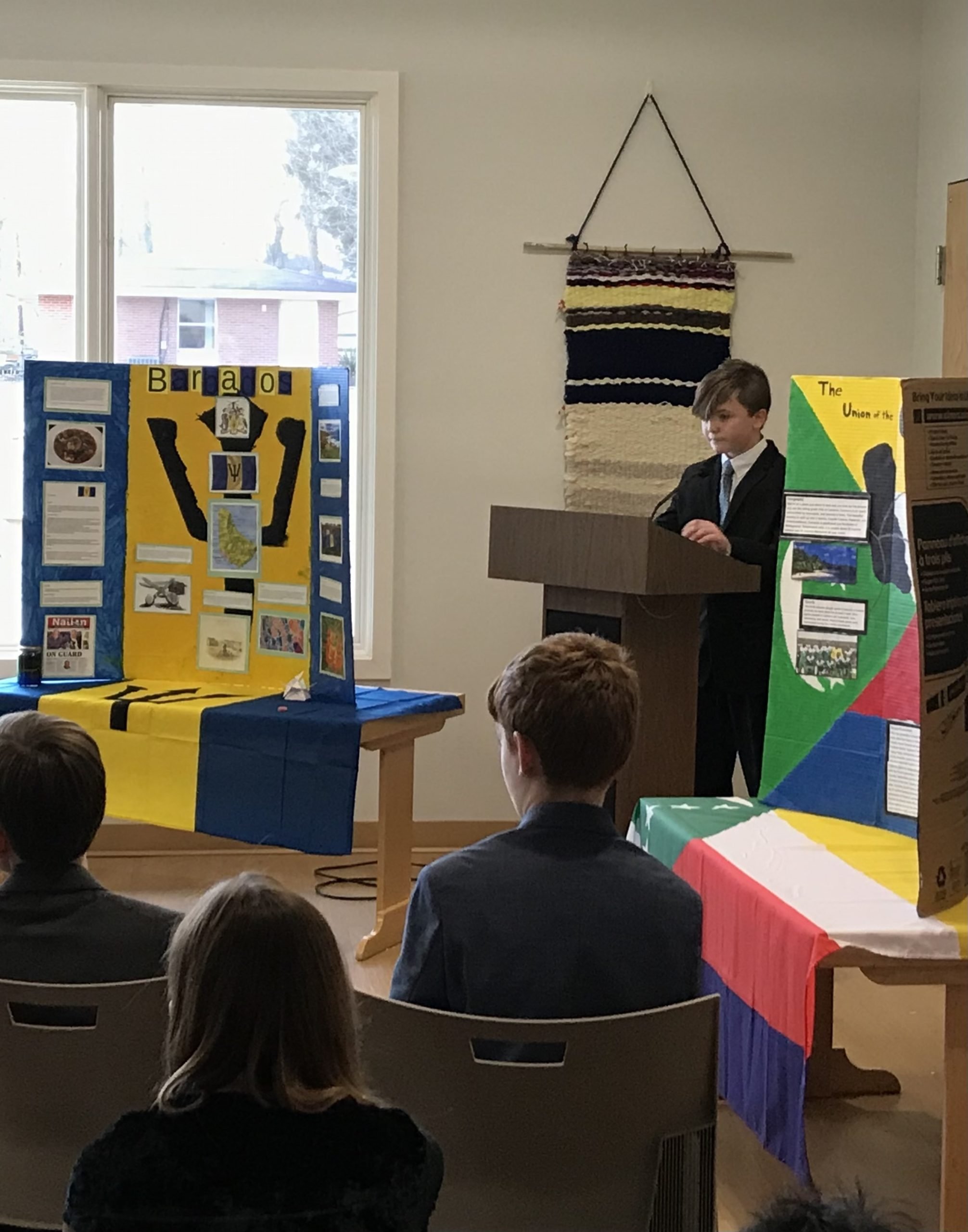 By the time they arrive in NYC, they are ready to deliver their speech with confidence.
By the time they arrive in NYC, they are ready to deliver their speech with confidence.
NYC Conference: Independence and Consensus
Next, students pack their bags, hug their parents goodbye and board the plane for the Big Apple!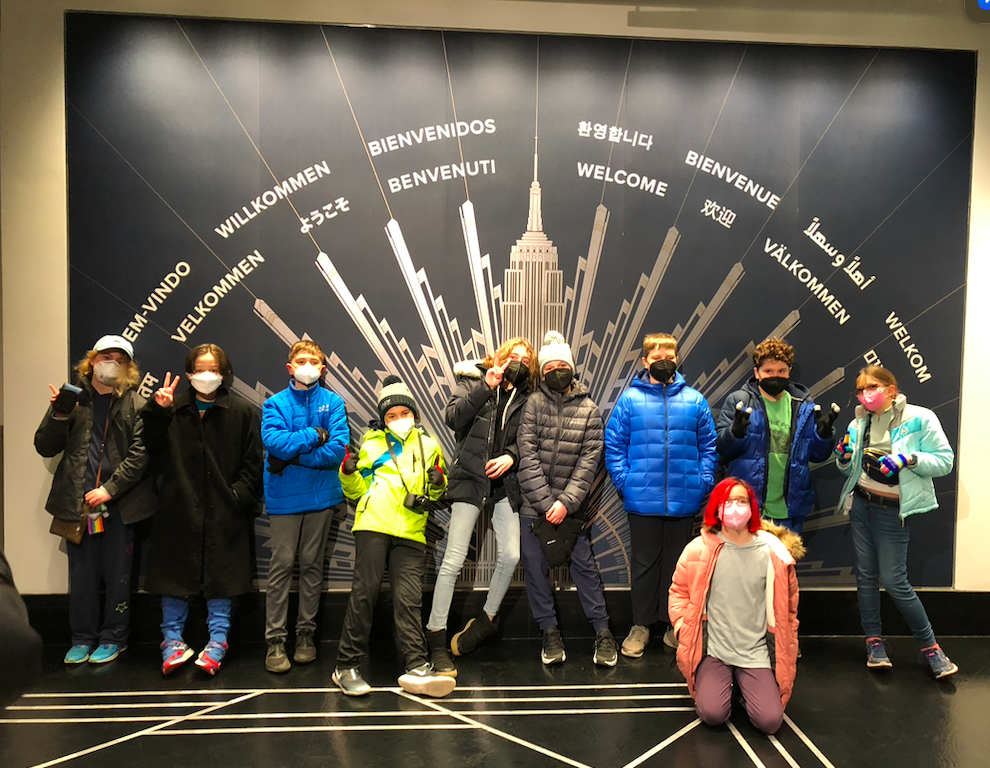
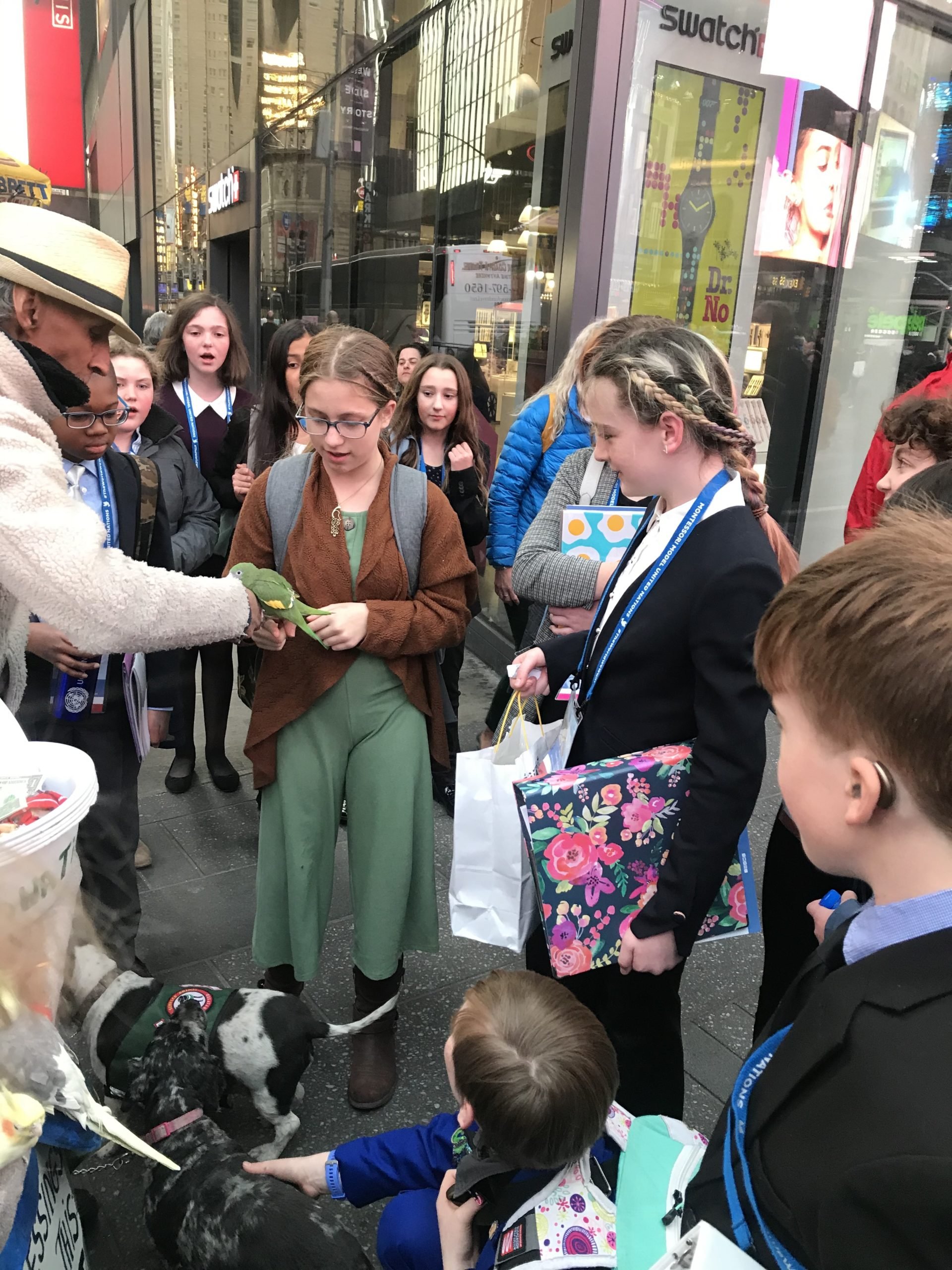
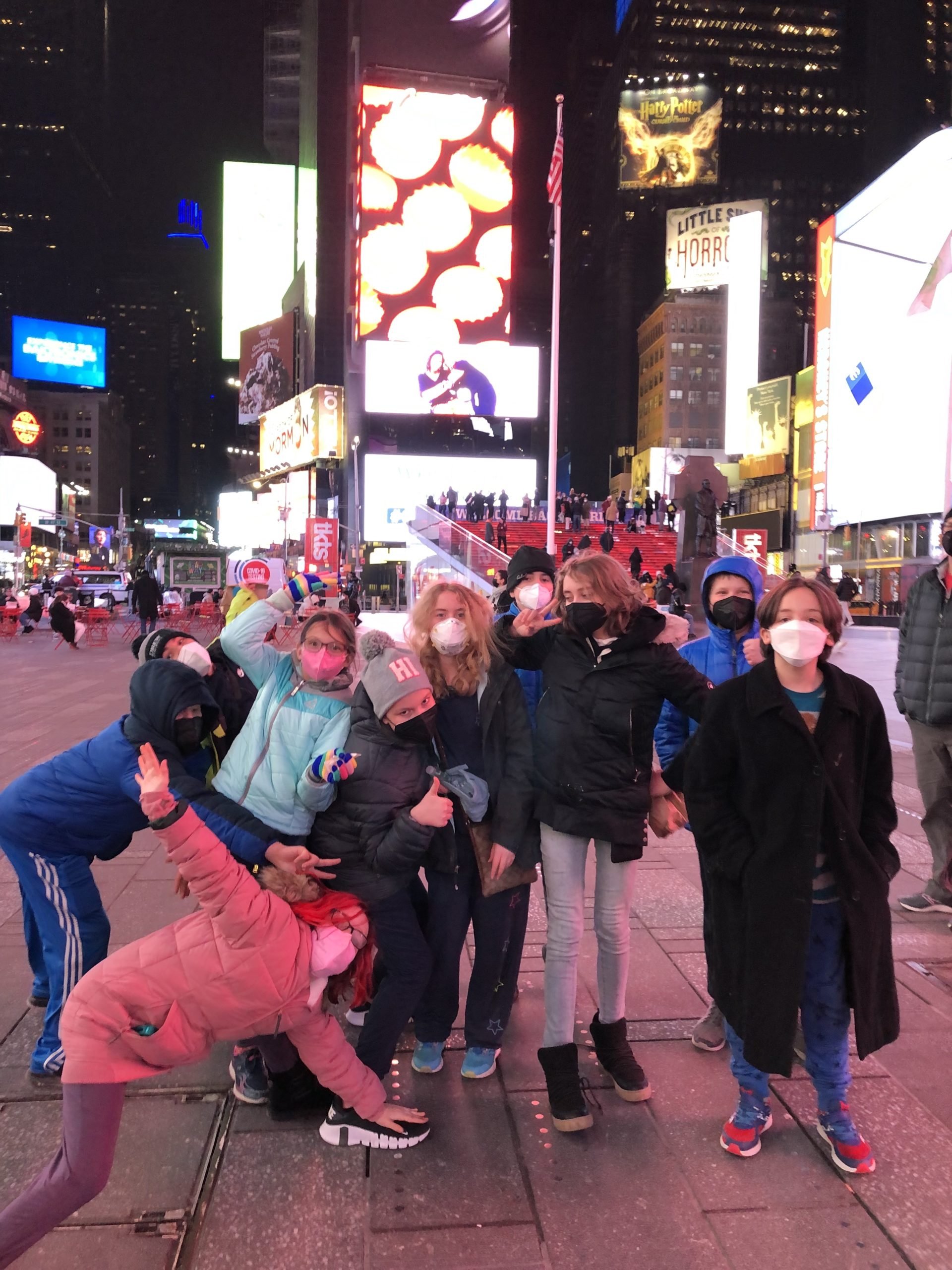 As in the Montessori classroom, we purposefully limit the number of adult chaperones on the trip to allow space for the adolescents' growing need for independence and to encourage them to rely upon one another. Students plan which sites and restaurants to visit, pay for their own meals, and help navigate their way through the city.The conference itself brings students from around the world together to collaborate on solutions. Guided by a bureau of former delegates in their respective committees, the delegates discuss different aspects of the issue and voice their nation's point of view.
As in the Montessori classroom, we purposefully limit the number of adult chaperones on the trip to allow space for the adolescents' growing need for independence and to encourage them to rely upon one another. Students plan which sites and restaurants to visit, pay for their own meals, and help navigate their way through the city.The conference itself brings students from around the world together to collaborate on solutions. Guided by a bureau of former delegates in their respective committees, the delegates discuss different aspects of the issue and voice their nation's point of view.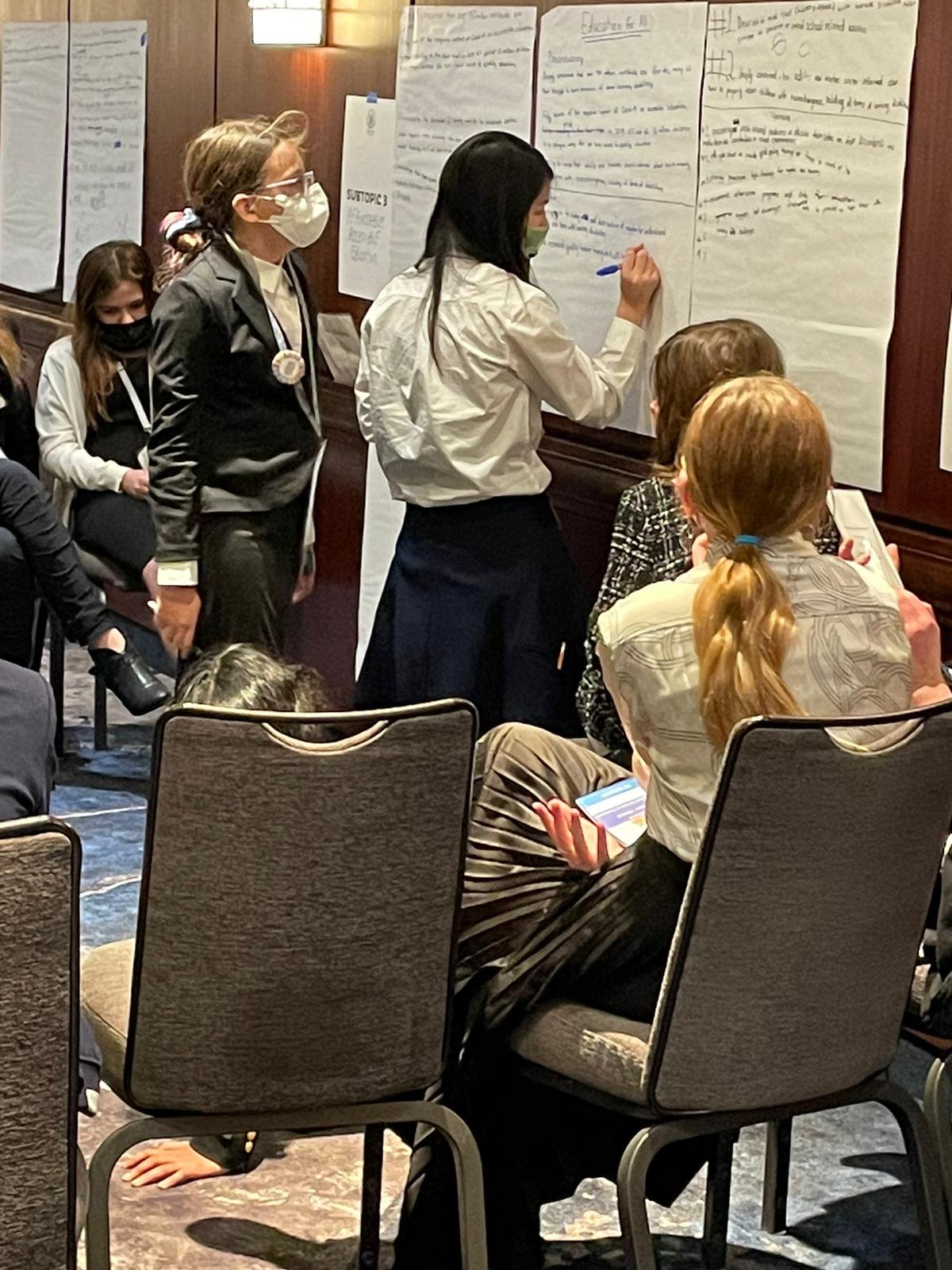
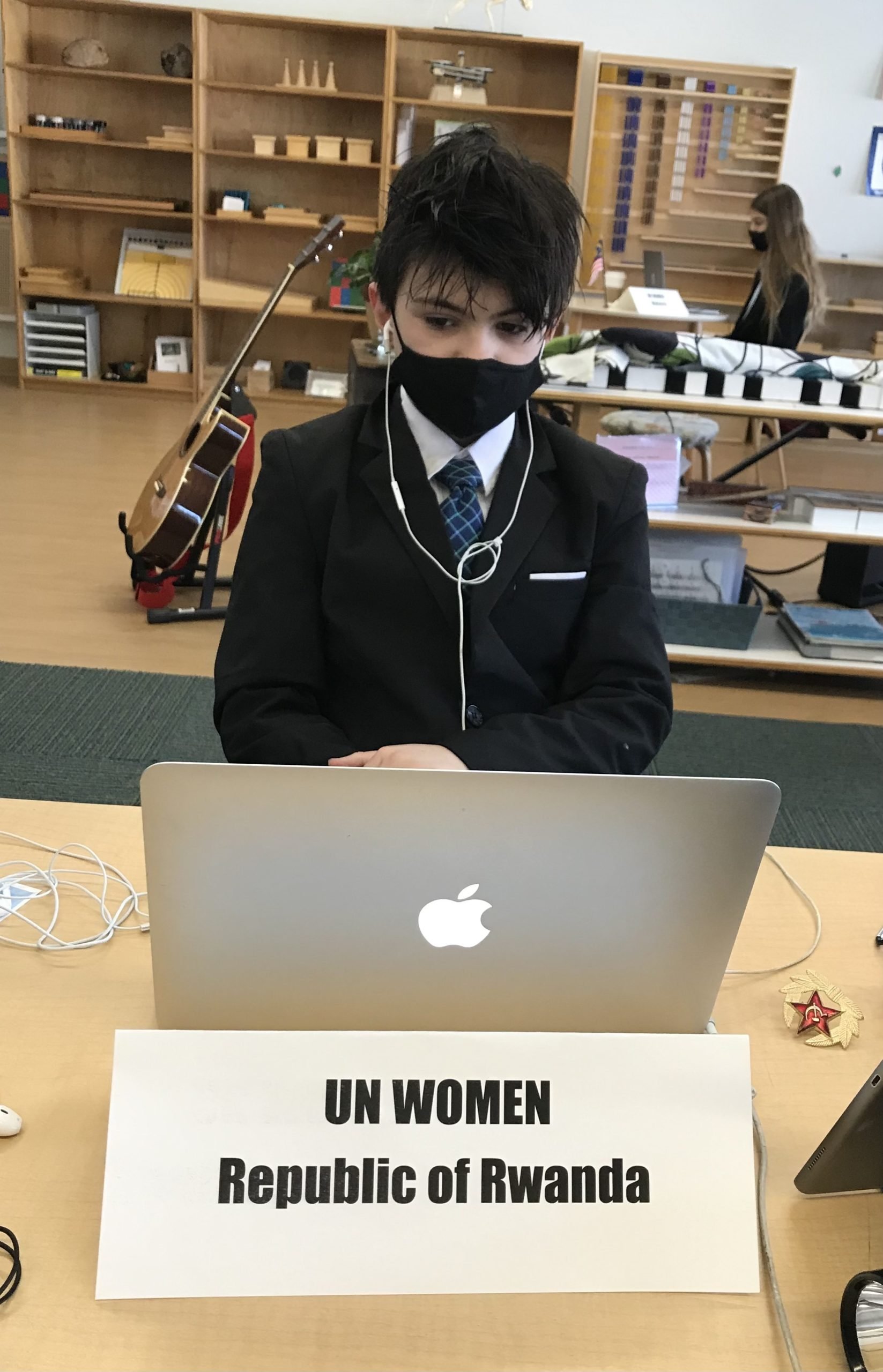 Equally important is the art of listening, the means to finding common ground. Inclusion, compromise, and consensus are the key tenets of the delegates' work at the conference. All voices are honored. All ideas are given equal consideration. Students feel empowered!
Equally important is the art of listening, the means to finding common ground. Inclusion, compromise, and consensus are the key tenets of the delegates' work at the conference. All voices are honored. All ideas are given equal consideration. Students feel empowered! Delegates definitely stand a little taller upon their return from the conference, a combination of feeling more independent, feeling proud and inspired by their work at the conference, and a new awareness of their role as a global citizen.
Delegates definitely stand a little taller upon their return from the conference, a combination of feeling more independent, feeling proud and inspired by their work at the conference, and a new awareness of their role as a global citizen.
Legacy Projects: Be the Change!
As our emerging adolescents develop awareness of their place in the world, their work as delegates also nurtures a sense of optimism about the future and helps them discover the power they have to create change in their own community and beyond.We harness the exhilaration delegates feel upon returning from the conference and help them launch legacy projects to enrich our community. Some projects have included planting trees on campus for more biodiversity, creating classroom materials for the Sustainable Development Goals, fundraising to help refugees in our community, and starting a lending library to promote literacy.The end of the MMUN conference does not mark the end of our delegates' journey. They carry their inspiration forward to future endeavors, and many can't wait to participate again next year at their new school!

